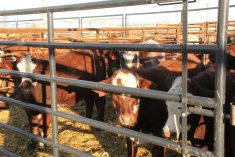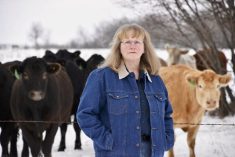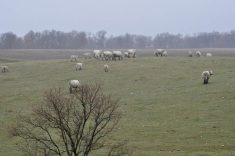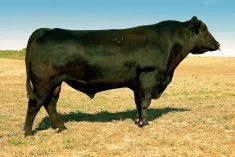Manitoba Angus breeders old and new were recognized during the Canadian Angus Association national convention in Brandon in June
Lyall Edgerton of Souris could be on a beach enjoying his retirement, but he’s not quite ready to give up on the Angus-breeding business, despite a half-century in the industry.
One of Manitoba’s long-standing seedstock producers, Edgerton was presented with a 50-year Canadian Angus Association Heritage Award June 10 in Brandon. Kuno Freitag of Alameda, Sask., was also recognized.
“It’s an honour,” Edgerton said. “It takes a lot of work for 50 years and I’ve seen the change in the Angus breed, from the small to the medium to the horsey ones and then back and we’re back in the middle. We have better-quality cattle (now) actually.”
Read Also
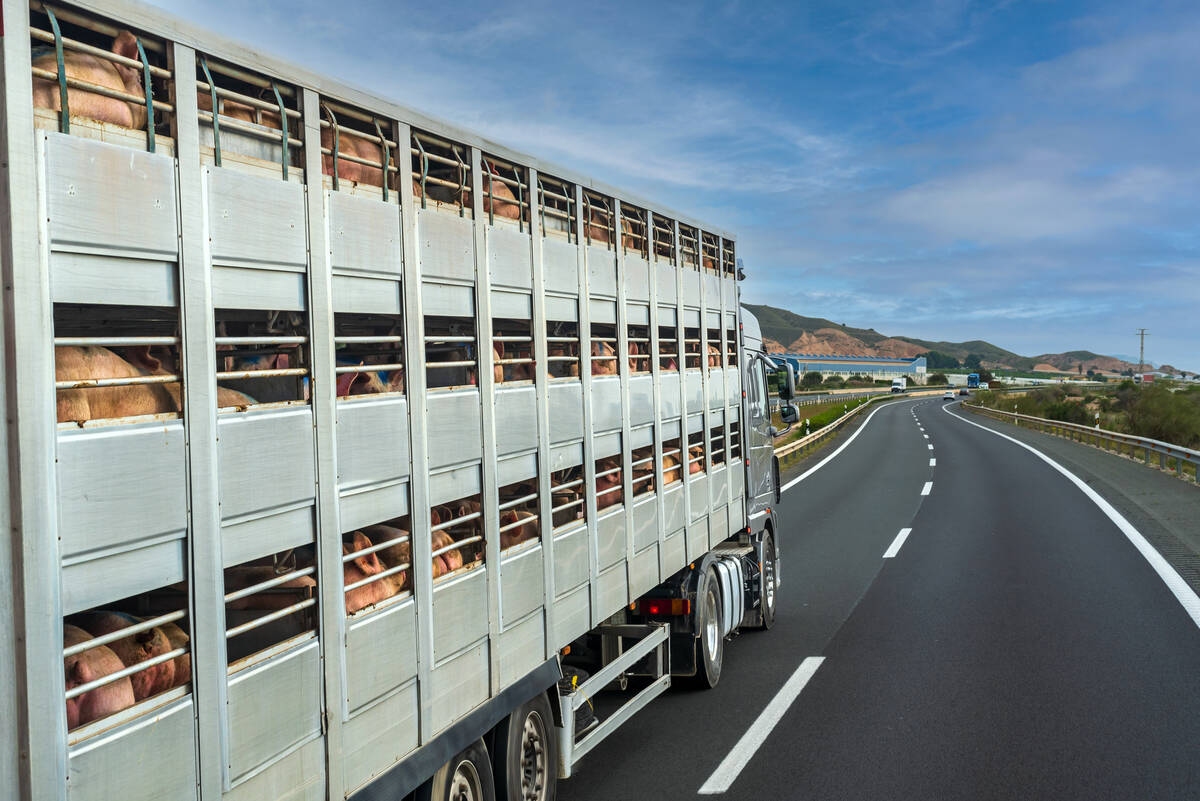
Pig transport stress costs pork sector
Popular livestock trailer designs also increase pig stress during transportation, hitting at meat quality, animal welfare and farm profit, Agriculture and Agri-Food Canada researcher says
Edgerton’s history with the breed dates back to 1967, when the then 21-year-old purchased four breeding females. It was the start of what would one day be Botany Angus.
By the early ’70s, Edgerton was expanding and adding technology. In 1972, he added 25 females to his herd. Artificial insemination was introduced, eventually putting Botany Angus onto the radar of the Douglas Manitoba Bull Test Station in 1979. By the time the first bull set foot in Douglas, Edgerton claimed 90 homebred registered animals.
By 1980, Edgerton was starting to turn his gaze overseas. Bulls were shipped to Mexico and the United States and he continued to sell internationally for decades.
Edgerton eventually spent six years on the Manitoba Angus Association board, including a two-year term as president. Likewise, his name became well associated with the Douglas test station, and he spent nine years as a board director of that facility.
Edgerton has outlasted many of his original compatriots in the provincial Angus association. He has seen past presidents and executives retire, some of whom have now passed away, while Edgerton himself remains at least nominally in the game.
Today, Edgerton still runs a 20-head herd with Ryan Shearer of Wawanesa, despite the same health problems that led him to sell his main herd in 2001. He mostly leaves physical labour for his partner, he said, but takes a leading role in registration and administration.
Building on past experience with artificial insemination, Edgerton and Shearer opted for yet more advanced technology after establishing the new elite herd. The pair carefully chose expensive, high-end females, which then became reciprocals for transplanted embryos. Transplanting embryos sparked a new aspect to Edgerton’s experience, but the high fertility of the breed soon created a different problem. They had more calves than the semi-retired Edgerton wanted.
In reaction, the partners began selling their own embryos overseas, finding markets in Mexico, Scotland and Finland before trade regulations eventually became prohibitive. Today, Edgerton and Shearer no longer deal internationally, but maintain their elite herd.
“It’s been a good time and the Angus breed is a good breed to be in,” Edgerton said.
Just starting out
Two of 2017’s Canadian Angus Association junior awards also went to Manitobans.
Austen Anderson of Swan River, Man., was named this year’s Outstanding Young Angus Breeder. The award is given to an association member between 22 and 30 years old, “who has demonstrated a desire to stay involved in the Angus business for years to come based on their involvement within the breed up to this point in his or her career.”
Anderson claimed both the title and the $3,500 cash prize.
“Our family’s gone through a lot of sacrifice and struggles over the years and it just feels incredibly validating to be named an outstanding young breeder,” he said. “It’s a real impressive group of alumni that I’ll be joining.”
Anderson’s family has farmed in the Swan River Valley since the late 1800s and, in 2011, was recognized by the CAA for 75 years in the Angus business.
In 1988, Anderson said, his family broke off from the century farm to start their own operation.
There were “little to no assets,” when the family struck out on its own, Anderson said, recalling years of tight margins and painstaking brand building.
The 2003 BSE crisis didn’t help. Like most in the beef sector, the Andersons were rocked by suddenly plummeting beef prices.
“We’ve done everything, worked off the farm and built Anderson Cattle Company from a bare sand quarter to one of the finest purebred operations in Manitoba and Western Canada,” Anderson said.
Today, the farm runs about 200 red and black Angus and sells about 50 bulls annually during its main spring sale.
June 10 was not the first time Anderson has been recognized by the national association. In 2011, Anderson was the voice of young breeders across Canada, serving a one-year term as the Robert C. McHaffie Junior Ambassador.
His most recent award is a bridge between junior and senior breeders and encourages youth to stay connected to the association after they age out of the junior programs, Anderson said.
“These are people who are maybe not operating their own farms yet. They’re in succession stages with their parents, so this gives them an opportunity to be recognized as being leaders within the breed,” he said.
Devon Donald, this year’s Junior Angus Stockman of the Year, is one of the breeders just starting out.
Like Anderson, Donald started young.
The breeder from Rossendale, Man., began working with cattle as a child. In 2006, he bought three heifers with the intention to build his own herd and eventually founded Diamond D Ranch.
Those first three cows have since bloomed into 75 head of purebred black Angus, a number Donald hopes will expand to over 100 in coming years. In the long term, he said, he would like to see 200-300 head roaming his land.
Part of that expansion will begin with his title as Junior Angus Stockman of the Year, an occurrence Donald described as, “incredible.”
“I’m speechless actually,” he said. “I’ve always wanted to win this award.”
Besides gaining exposure for his young operation, Donald plans to spend his prize money on another breeding female this fall.
“It’ll really help my herd grow in numbers and performance, so I’m really looking forward to that,” he said.
All three awards were announced as part of the Canadian Angus Association national convention June 8-11.









